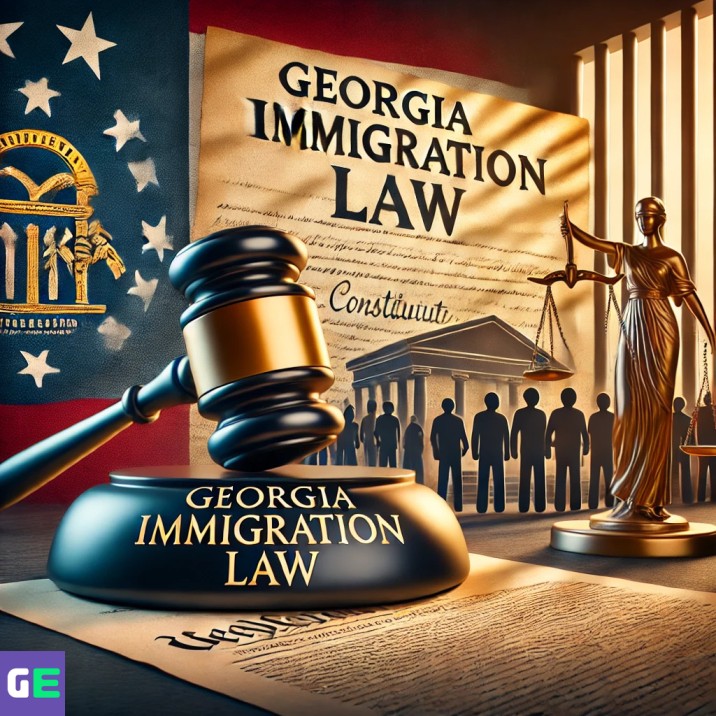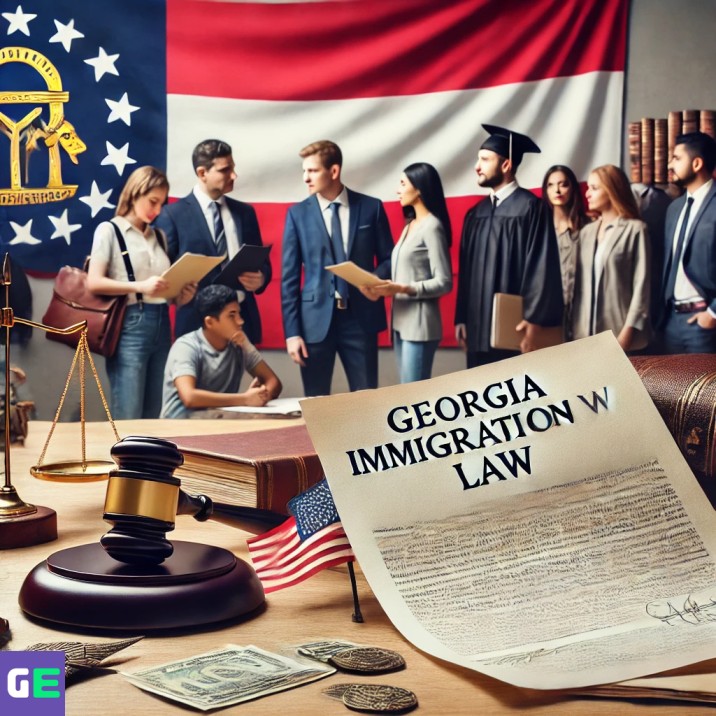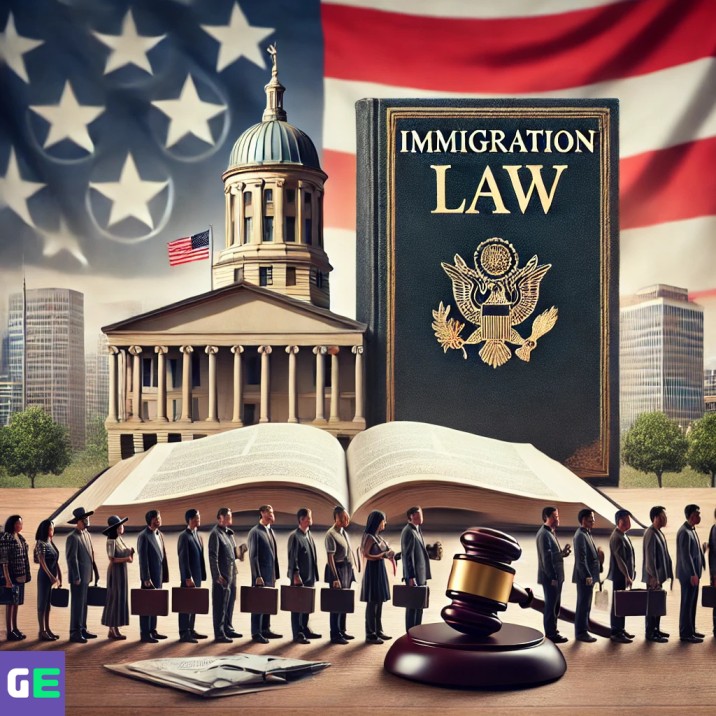Introduction
In 2025, Georgia Immigration Law remains a critical topic for immigrants, employers, and legal professionals. Immigration policies in Georgia have undergone several changes in recent years, affecting undocumented individuals, lawful residents, and businesses that employ foreign workers. Understanding the latest updates to Georgia Immigration Law is essential for anyone living or working in the state.
This guide will cover everything you need to know about Georgia Immigration Law in 2025, including legal rights, employment laws, enforcement policies, and future predictions. Whether you are an immigrant trying to maintain legal status, a business owner hiring workers, or simply interested in immigration policies, this article provides a comprehensive overview of the topic.
Understanding Georgia Immigration Law
What is Georgia Immigration Law?
Georgia Immigration Law refers to the state-specific rules and regulations that govern how immigrants can live, work, and interact with the legal system in Georgia. While immigration is primarily governed by federal law, Georgia has its own policies that impact immigrants, particularly in areas like law enforcement cooperation, employment verification, and access to public benefits.
The state has historically been strict on immigration, enforcing some of the toughest laws in the country. Georgia mandates E-Verify for most employers, has strict policies on undocumented immigrants, and cooperates closely with federal immigration enforcement agencies like Immigration and Customs Enforcement (ICE).
How Georgia Immigration Law Differs from Federal Law
Federal immigration law, enforced by agencies such as the U.S. Citizenship and Immigration Services (USCIS) and the Department of Homeland Security (DHS), sets the overall rules for visas, green cards, and deportations. However, individual states, including Georgia, can enact their own laws that impact immigrants on a local level.
For example, Georgia has strict E-Verify requirements, limiting job opportunities for undocumented immigrants. Additionally, local law enforcement agencies in Georgia often assist ICE in enforcing deportation laws. Unlike some states that have sanctuary policies, Georgia enforces laws that increase the risk of deportation for undocumented immigrants.
Key Updates to Georgia Immigration Law in 2025
Each year, Georgia Immigration Law undergoes updates that impact both immigrants and employers. In 2025, some of the most significant changes include:
- Stricter Work Authorization Checks: Georgia continues to enforce E-Verify for all businesses with more than 10 employees, ensuring that all workers have legal work authorization.
- Enhanced Cooperation with ICE: Local police departments are increasing collaboration with ICE, leading to more deportation cases involving undocumented immigrants.
- Tighter Public Benefits Regulations: There are new restrictions on state-funded benefits for undocumented immigrants, making it harder for them to access healthcare and social services.
- Driver’s License Restrictions: Some undocumented immigrants may face additional barriers when applying for driver’s licenses or state-issued identification cards.
These updates make it crucial for immigrants and business owners to stay informed and ensure compliance with Georgia Immigration Law to avoid penalties and legal complications.
How Georgia Immigration Law Affects Undocumented Immigrants
Current Enforcement Policies
Georgia is known for its strict approach to immigration enforcement. Under Georgia Immigration Law, local law enforcement agencies are authorized to check the immigration status of individuals in certain situations. While federal law prohibits racial profiling, reports suggest that certain groups are more frequently targeted for immigration checks.
In addition, Georgia participates in the federal 287(g) program, which allows state and local law enforcement agencies to work closely with ICE to detain and deport undocumented immigrants.
Legal Pathways for Undocumented Immigrants
For undocumented immigrants living in Georgia, there are limited pathways to legal status. However, some options include:
- DACA (Deferred Action for Childhood Arrivals): Protects eligible undocumented individuals who came to the U.S. as children from deportation.
- Asylum and Humanitarian Relief: Those facing persecution in their home country may qualify for asylum or refugee status.
- Family-Based Immigration: Some undocumented immigrants can adjust their status if they have immediate family members who are U.S. citizens or legal residents.
Seeking legal assistance is essential for undocumented immigrants trying to navigate the complexities of Georgia Immigration Law.
Georgia Immigration Law and Employers
Hiring Laws and Employer Responsibilities
Employers in Georgia must comply with Georgia Immigration Law to avoid penalties and fines. One of the key requirements is the mandatory use of E-Verify, a federal system that checks the legal work status of employees.
Under Georgia law, employers who fail to verify work eligibility may face the following consequences:
- Fines ranging from $1,000 to $25,000
- Loss of business licenses
- Legal action from federal immigration authorities
Work Visas and Sponsorship Process
For businesses that rely on foreign workers, Georgia Immigration Law dictates strict requirements for work visas and sponsorships. The most common work visas include:
- H-1B Visa: For highly skilled professionals in specialized fields.
- H-2A Visa: For seasonal agricultural workers.
- H-2B Visa: For seasonal non-agricultural workers.
Employers must follow specific guidelines to sponsor foreign workers legally, including proving that there are no qualified U.S. workers available for the job.
Georgia Immigration Law and Law Enforcement
Role of Local Authorities in Immigration Enforcement
Under Georgia Immigration Law, local authorities play an active role in immigration enforcement. The state has enacted policies that allow police officers to check immigration status during traffic stops and other law enforcement interactions.
Unlike sanctuary cities that limit cooperation with ICE, Georgia requires law enforcement agencies to share information with federal immigration authorities. This policy has led to an increase in detentions and deportations.
Criminal Charges and Immigration Consequences
For immigrants, even minor legal infractions can have severe consequences under Georgia Immigration Law. Misdemeanors, such as driving without a license, can lead to deportation in some cases. Felony convictions can have even harsher consequences, making it crucial for immigrants to understand the legal risks they face.
Legal Rights and Resources for Immigrants
Understanding Your Rights Under Georgia Immigration Law
Despite the strict policies, immigrants in Georgia have legal rights, including:
- The right to remain silent if questioned about immigration status.
- The right to an attorney if facing deportation proceedings.
- Protection from unlawful searches and detentions.
How to Find Immigration Lawyers and Legal Aid
Several organizations in Georgia offer legal support for immigrants, including:
- Georgia Immigration and Refugee Advocacy Coalition (GIRAC)
- Catholic Charities Atlanta Immigration Services
- Southern Poverty Law Center
Seeking professional legal help can make a significant difference for immigrants navigating Georgia Immigration Law.
Future of Georgia Immigration Law: What to Expect Beyond 2025
With immigration remaining a hot political issue, future changes to Georgia Immigration Law are likely. Possible developments include:
- Stricter Deportation Policies: Increased enforcement may lead to more deportations.
- Changes in Work Visa Regulations: Employers may face new hurdles in hiring foreign workers.
- Potential for Immigration Reform: Future federal policies could impact Georgia’s approach to immigration.
As the political climate shifts, staying informed about changes in Georgia Immigration Law will be crucial for immigrants, employers, and policymakers alike.
Conclusion
Navigating Georgia Immigration Law in 2025 requires awareness of legal rights, employer responsibilities, and enforcement policies. With strict regulations on employment, law enforcement cooperation with ICE, and potential policy changes on the horizon, immigrants and business owners alike must stay updated on the latest legal developments.
For those affected by Georgia Immigration Law, seeking legal advice and staying informed can help avoid serious consequences. By understanding and complying with immigration policies, individuals and businesses can better navigate the complexities of Georgia’s legal landscape Read more
FAQs
###### 1. What is Georgia Immigration Law and How Does it Affect Immigrants?
Georgia Immigration Law refers to the state’s regulations that govern how immigrants can live, work, and interact with local authorities. While federal laws set the foundation for immigration policies, Georgia has its own rules that impact undocumented immigrants, businesses hiring foreign workers, and law enforcement cooperation with federal agencies like Immigration and Customs Enforcement (ICE).
This law significantly affects immigrants by imposing strict E-Verify requirements for employers, limiting access to state-funded benefits, and increasing deportation risks through cooperation with ICE. Immigrants in Georgia must stay informed about legal changes to ensure they comply with the state’s regulations.
###### 2. What Are the Latest Changes to Georgia Immigration Law in 2025?
In 2025, several updates to Georgia Immigration Law have taken effect, impacting both immigrants and employers. Key changes include:
- Stricter E-Verify enforcement: Businesses must now verify the immigration status of all employees, including contract workers.
- Increased local cooperation with ICE: Georgia’s law enforcement agencies are required to report undocumented immigrants to federal authorities, leading to a rise in deportations.
- New public benefits restrictions: Undocumented immigrants face tighter restrictions when applying for state-funded healthcare, education, and other services.
- More challenges in obtaining driver’s licenses: Immigrants, particularly undocumented individuals, may encounter additional verification requirements.
Understanding these changes is essential for anyone affected by Georgia Immigration Law, as non-compliance can result in severe legal consequences.
###### 3. How Does Georgia Immigration Law Impact Undocumented Immigrants?
Undocumented immigrants in Georgia face numerous challenges due to the state’s strict immigration laws. One of the biggest risks is deportation, as Georgia has some of the toughest enforcement policies in the U.S. Through programs like 287(g), local police collaborate with ICE to detain and deport undocumented individuals.
Additionally, undocumented immigrants are often denied access to public benefits, such as in-state tuition at colleges and financial assistance programs. Many also struggle with employment opportunities due to mandatory E-Verify checks, which make it difficult to find legal work. Understanding Georgia Immigration Law is crucial for undocumented immigrants to navigate their legal rights and seek available legal pathways to adjust their status.
###### 4. Can Employers Hire Undocumented Workers Under Georgia Immigration Law?
No, under Georgia Immigration Law, employers are prohibited from knowingly hiring undocumented workers. The state has one of the strictest E-Verify requirements, making it mandatory for businesses with more than ten employees to confirm the work eligibility of their staff.
Employers who fail to comply with these regulations face severe penalties, including fines, legal action, and potential loss of business licenses. Additionally, Georgia law allows authorities to conduct audits and inspections to ensure businesses comply with work authorization laws.
To avoid legal trouble, employers should follow the correct procedures when hiring foreign workers, ensuring they have proper work permits or visas under U.S. immigration policies.
###### 5. What Rights Do Immigrants Have Under Georgia Immigration Law?
Despite Georgia’s strict stance on immigration, immigrants still have rights under both state and federal law. These include:
- The right to remain silent if questioned about immigration status by law enforcement.
- The right to legal representation in immigration court proceedings.
- Protection from unlawful searches and detentions, unless a valid warrant is presented.
- The right to seek asylum or legal relief if they fear persecution in their home country.
However, undocumented immigrants must be cautious, as Georgia Immigration Law allows local police to check immigration status under certain circumstances. Consulting an immigration attorney can help immigrants understand and protect their legal rights.
###### 6. How Can Immigrants in Georgia Obtain Legal Status?
There are several ways immigrants in Georgia can obtain legal status, but the process depends on individual circumstances. Some of the most common pathways include:
- Family-based immigration: Those with close family members who are U.S. citizens or legal residents may be eligible for a green card.
- Employment-based visas: Skilled workers can apply for employment visas such as H-1B or PERM labor certification.
- Asylum or refugee status: Those fleeing persecution in their home countries may qualify for asylum.
- DACA (Deferred Action for Childhood Arrivals): Eligible undocumented individuals who arrived in the U.S. as children may receive protection from deportation and work authorization.
Each pathway has specific requirements, so immigrants should seek legal advice to determine the best option under Georgia Immigration Law.
###### 7. What Are the Penalties for Violating Georgia Immigration Law?
Violating Georgia Immigration Law can lead to severe consequences for both immigrants and employers. Some of the most common penalties include:
- Deportation for undocumented immigrants: Individuals caught violating immigration laws face a higher risk of being detained and removed from the U.S.
- Fines and imprisonment: Those involved in illegal activities, such as using false documents, may face criminal charges.
- Business penalties: Employers who fail to comply with E-Verify requirements can be fined or have their business licenses revoked.
Understanding and following Georgia’s immigration laws can help individuals and businesses avoid costly legal issues.
###### 8. Can Immigrants Apply for a Driver’s License Under Georgia Immigration Law?
Under Georgia Immigration Law, only certain categories of immigrants can obtain a driver’s license. Lawful permanent residents, visa holders, and DACA recipients may qualify if they meet the state’s requirements.
However, undocumented immigrants cannot obtain a Georgia driver’s license, as the state requires applicants to provide proof of legal presence in the U.S. This restriction has led to challenges for many undocumented individuals who rely on driving for work and daily activities.
Some advocacy groups are pushing for reforms to expand driver’s license access, but as of 2025, Georgia remains one of the strictest states in this regard.
###### 9. How Does Georgia Immigration Law Affect Students and Education?
Students, particularly undocumented immigrants, face challenges under Georgia Immigration Law when it comes to accessing higher education. Some key impacts include:
- No in-state tuition: Undocumented students are required to pay out-of-state tuition at public universities, making education more expensive.
- Limited scholarships and financial aid: Most state-funded financial aid programs are unavailable to undocumented students.
- Restricted college admissions: Some public universities in Georgia have policies barring undocumented students from enrollment.
Despite these barriers, private scholarships and organizations offer financial assistance to immigrant students. Additionally, DACA recipients may qualify for certain educational benefits, depending on the institution.
###### 10. What Is the Future of Georgia Immigration Law?
The future of Georgia Immigration Law depends on political changes at both the state and federal levels. Some potential developments include:
- Stricter enforcement policies: Georgia may introduce tougher laws targeting undocumented immigrants and increasing deportation efforts.
- Immigration reform at the federal level: If Congress passes new immigration laws, they could impact how Georgia enforces its own policies.
- Advocacy efforts for more immigrant-friendly policies: Activist groups continue to push for reforms, such as driver’s license access and in-state tuition for undocumented students.
Staying informed about changes in Georgia Immigration Law is crucial for immigrants, businesses, and legal professionals, as policies continue to evolve.
Final Thoughts
These FAQs provide a comprehensive look at Georgia Immigration Law and its impact in 2025. Whether you are an immigrant, an employer, or a concerned citizen, understanding these laws can help you navigate the legal landscape more effectively. If you need legal assistance, consulting an immigration attorney is highly recommended










Leave a Reply